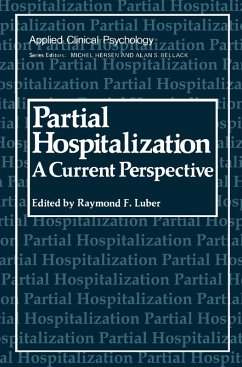There was a time, not long ago, when the only treatment options considered to be worthwhile for patients requiring psychiatric care were the 50-minute hour on the one hand, or full-time hospitalization on the other. Most of us were convinced in those days that treatment could, and indeed should, take place with a minimum of involvement by the patient's family. Nor did we really consider that the community in which a patient lived was a significant contributor to either his illness or its cure. These naive assumptions were strongly challenged, of course, be ginning with the questions of social psychiatrists in the 50s and con tinuing with the quiet growth of the patients' rights movement. Thus it is no mere coincidence that when the community psychiatry movement emerged in the mid-60s as a powerful force for profound change in our traditional practice, the concept of partial hospitalization, which can be traced back at least 30 years, became a symbol of the new social psychiatry. Partial hospitalization had singular advantages well attuned to the times: it did not force a separation between the patient and his family; it cost far less to deliver than inpatient care; and it avoided the stigma of institutionalization while still providing far more care than the traditional psychotherapeutic hour. In a few years' time, several well controlled studies documented that virtually all patients who were cus tomarily treated on an inpatient basis could be effectively managed and treated in a day hospital.
Hinweis: Dieser Artikel kann nur an eine deutsche Lieferadresse ausgeliefert werden.
Hinweis: Dieser Artikel kann nur an eine deutsche Lieferadresse ausgeliefert werden.









